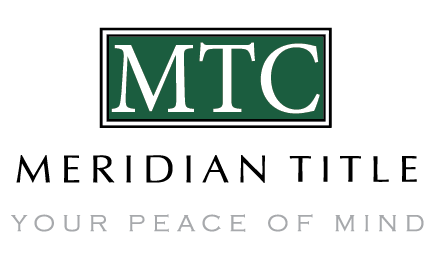ALTA Best Practice Policies
Meridian Title Corporation is proud to operate according to “Title Insurance and Settlement Company Best Practices” as set forth by the American Land Title Association.
The Best Practices framework was developed to provide a benchmark for the real estate settlement and mortgage lending industries. It is comprised of voluntary guidelines, which help us highlight the ways in which we protect our customers and meet legal and market requirements. ALTA’s 7 Pillars of Best Practices are detailed below, along with a description of the policies and procedures that we employ in order to meet these Best Practices.
Pillar #1: Establish and maintain current License(s) as required to conduct the business of title insurance and settlement services.
Purpose: Maintaining state-mandated insurance licenses and corporate registrations (as applicable) helps ensure that companies remain in good standing with the state.
Meridian Title holds all state mandated title insurance licenses and applicable individual licenses for employees, and conducts annual reviews to ensure continuing compliance.
Pillar #2: Adopt and maintain appropriate written procedures and controls for Escrow Trust Accounts allowing for electronic verification of reconciliation.
Purpose: Appropriate and effective escrow controls and staff training help title and settlement companies meet client and legal requirements for the safeguarding of client funds. These procedures help ensure accuracy and minimize the exposure to loss of client funds.
Meridian Title maintains all proper Escrow Trust Account controls and authorizations in accordance with regulations set forth by the Consumer Financial Protection Bureau, our underwriters, and all states in which we operate. Reconciliation of Escrow accounts are performed daily and segregation of duties is in place to ensure security and reliability.
Pillar #3: Adopt and maintain a written privacy and information security program to protect Non-public Personal Information as a required by local, state and federal law.
Purpose: Federal and state laws (including the Gramm-Leach-Bliley Act) require title companies to develop a written information security program that describes the procedures they employ to protect Non-public Personal Information. The program must be appropriate to the company’s size and complexity, the nature and scope of the company’s activities, and the sensitivity of the customer information the company handles. A company evaluates and adjusts its program in light of relevant circumstances, including changes in the company’s business or operations, or the results of security testing and monitoring.
Meridian Title’s vendors are fully vetted to enhance consumer experience and to protect security of Non-Public Personal Information (NPI). We have internal audits in place in order to prevent the potential for improper disclosure of NPI. We employ controls for both physical and network security of NPI; which include, but are not limited to, employee background checks, data encryption, proper storage of confidential information, and proper disposal of NPI in accordance with local, state and federal law.
Pillar #4: Adopt standard real estate settlement procedures and policies that help ensure compliance with Federal and State Consumer Financial Laws as applicable to the Settlement process.
Purpose: Adopting appropriate policies and conducting ongoing employee training helps ensure title companies can meet state, federal, and contractual obligations governing the Settlement.
Meridian Title has written procedures for recording that ensure recording occurs in a timely manner and complies with state, federal and underwriter regulations. We have written procedures for pricing that ensure customers are charged the correct title insurance premium and other rates for services provided. These procedures comply with state, federal and underwriter regulations. All employees are trained on these procedures and internal audits are routinely performed to ensure that all employees are compliant with these policies.
Pillar #5: Adopt and maintain written procedures related to title policy production, delivery, reporting, and premium remittance.
Purpose: Adopting appropriate procedures for the production, delivery, and remittance of title insurance policies helps ensure title companies can meet their legal and contractual obligations.
Meridian Title has written procedures for title production and policy delivery to ensure that title insurance policies are issued and delivered to customers in a timely manner and that insurance policies comply with state, federal and underwriter regulations. We have written procedures for premium reporting and remittance to ensure that title insurance policies are reported and premiums are remitted to our underwriter in a timely manner and comply with state, federal and underwriter regulations. All employees are trained on these procedures and internal audits are routinely performed to ensure that all employees are compliant with these policies.
Pillar #6: Maintain appropriate professional liability insurance and fidelity coverage.
Purpose: Appropriate levels of professional liability insurance or errors and omissions insurance help ensure title agencies and settlement companies maintain the financial capacity to stand behind their professional services. In addition, state law and title insurance underwriting agreements may require a company to maintain professional liability insurance or errors and omissions insurance, fidelity coverage or surety bonds.
Meridian Title maintains professional liability insurance, and other applicable insurance, in compliance with state laws and title insurance underwriting agreements.
Pillar #7: Adopt and maintain written procedures for resolving consumer complaints.
Purpose: A process for receiving and addressing consumer complaints helps ensure reported instances of poor service or non-compliance do not go undiscovered.
Meridian Title has written procedures in place in order to record, review, and resolve customer complaints in a timely manner. Customers can submit a complaint via our website, email or phone. It is our mission to give you the best standard of customer service and we welcome your feedback.
